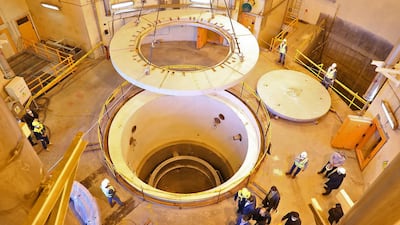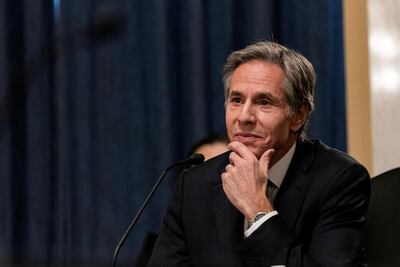The Biden administration has, quite naturally, prioritised resolving some of America’s greatest domestic challenges, particularly the Covid-19 pandemic and the bitter partisan divide that has led to deep social fissures across the country. In fact, President Joe Biden will be dedicating a significant portion of his first many days in office sorting out matters at home, leaving his foreign policy team to deal with the pressing issues beyond its borders.
Secretary of State nominee Antony Blinken and Secretary of Defence Lloyd Austin will have their work cut out, as they go about the difficult task of re-engaging with an international community less trusting of the US following four chaotic years under the preceding Trump administration. Moves have already been made to assuage concerns among fellow members of the Nato security alliance, as well as treaty allies in East Asia, regarding American commitment towards their security. There is promise of a five-year extension to the New START arms control treaty with Russia, and the US State Department is already reviewing its North Korea policy.
There is also good news with regard to the Middle East.
Curiously, the Biden administration seems to have cooled on the one talking point its key personnel harped on during the political transition over the past couple of months: the revival of the 2015 Iran nuclear deal, which Donald Trump withdrew the US from almost three years ago. Iran, in turn, went on to breach major parts of the deal. These breaches include resuming uranium enrichment at 20 per cent purity, increasing Tehran’s low-enriched uranium stockpile by 12 times the amount allowed under the accord and testing advanced centrifuges.
Mr Blinken and Mr Biden’s National Security Adviser, Jake Sullivan, had previously expressed their keenness to pursue a two-track strategy of reviving the so-called Joint Comprehensive Plan of Action – or JCPOA – and lifting sanctions against Tehran before negotiating with the regime over their ballistic missiles programme.
The Biden team has since sought to tamp down expectations. There are signs that they will, instead, build on the Trump administration’s pressure tactics against Iran with a view to curb its destabilising activities in various parts of the Middle East, as Mr Blinken himself recently put it. He said returning to JCPOA is predicated upon Tehran’s compliance, while confirming that these conditions are not being satisfied at present.
“We are a long way from there,” Mr Blinken told the US Senate Foreign Relations Committee last week. “We would then have to evaluate whether they were actually making good if they say they are coming back into compliance with their obligations, and then we would take it from there.”
Avril Haines, Director of National Intelligence, also said that a decision to return to the pact is not imminent. “[Mr Biden] has indicated that if Iran were to come back into compliance, he would direct that we do so as well. And I think, frankly, that we are a long ways from that,” she said.
Perhaps the new administration has other foreign policy priorities, particularly collective security in East Asia amid what it perceives to be the rising threat of China. Perhaps the Biden team listened to concerns expressed by voices in the Middle East about the dangers of returning to talks with an Iranian regime that has made ideological expansion across the region its ultimate goal. Indeed, it should be clear by now the damage being done by the Iranian regime, which includes the creation and sustenance of armed proxies in countries with weak governments, such as Iraq, Syria and Lebanon. Many politicians in these countries are little more than puppets being controlled by Tehran.
Perhaps the escalating tensions between the Trump administration and the regime in recent months have led to the pause, at least for the time being.
Yet, despite the shift in mood in Washington, the Gulf countries will be watchful and the Biden administration should look to the Gulf Co-operation Council to play a vital role in keeping the peace.
It is clear that the GCC is determined to put its concerns and interests on the table if the Biden team were to begin renegotiation of the nuclear deal in the future. Amid the uncertainty, the six-nation grouping has sought to remind the administration of its unique understanding of Iran’s behaviour. As neighbours, the Gulf countries are all too aware of the consequences of Tehran’s actions in the Strait of Hormuz. “Whatever you [Washington] know about the region, we know more,” Nayef Al Hajraf, the GCC Secretary General, told me recently. “We are trusted partners and we have a strategic relationship.”
Indeed, the Biden administration must understand the GCC’s role as a responsible stakeholder in a region that is otherwise riddled with a range of issues. Even as other countries struggle to deal with the economic fall-out of the pandemic, the Gulf nations are already focused on diversifying their economies and empowering their youth. And for what it's worth, they have always been advocates for constructive dialogue with all their neighbours – including Iran.
As the former US Special Representative for Syria, James Jeffrey, said, the Biden administration will do well to “listen” to the region. “They will look to the people of the region to explain three things: one, why the region remains very important to Americans; two, what the region is doing to deal with these problems itself and can be counted on by the United States to do; and thirdly, what the region needs the United States to do.”
One of the truisms about an overstretched America, as Mr Jeffrey pointed out, is that there is only so much this administration can do – as there was only so much the previous administration could do. It must therefore rely on its partners on the ground. The dangers of not doing so are real.
“The last thing the new administrations wants," according to Mr Al Hajraf, "is to have a destabilised region that will affect the supply of the energy, which will further destabilise economic reform in the region and create tensions – fuelled and fed by Iranian behaviour."
Raghida Dergham is the founder and executive chairwoman of the Beirut Institute and a columnist for The National




